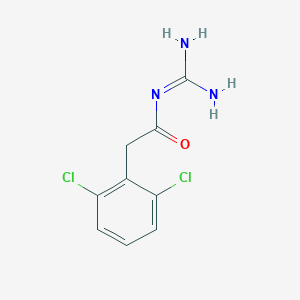| 1 |
Recurrent recessive mutation in deoxyguanosine kinase causes idiopathic noncirrhotic portal hypertension.Hepatology. 2016 Jun;63(6):1977-86. doi: 10.1002/hep.28499. Epub 2016 Mar 31.
|
| 2 |
Guanfacine FDA Label
|
| 3 |
ClinicalTrials.gov (NCT03116126) Randomised Clinical Trial of Noradrenergic Add-on Therapy With Extended-Release Guanfacine in Alzheimer's Disease. U.S.National Institutes of Health.
|
| 4 |
Atenolol FDA Label
|
| 5 |
URL: http://www.guidetopharmacology.org Nucleic Acids Res. 2015 Oct 12. pii: gkv1037. The IUPHAR/BPS Guide to PHARMACOLOGY in 2016: towards curated quantitative interactions between 1300 protein targets and 6000 ligands. (Ligand id: 548).
|
| 6 |
Scientific rationale for the use of alpha2A-adrenoceptor agonists in treating neuroinflammatory cognitive disorders. Mol Psychiatry. 2023 Apr 7:1-13.
|
| 7 |
An in vitro evaluation of guanfacine as a substrate for P-glycoprotein. Neuropsychiatr Dis Treat. 2011;7:501-5.
|
| 8 |
Change in mRNA Expression after Atenolol, a Beta-adrenergic Receptor Antagonist and Association with Pharmacological Response. Arch Drug Inf. 2009 Sep;2(3):41-50. doi: 10.1111/j.1753-5174.2009.00020.x.
|
| 9 |
Prediction and experimental validation of acute toxicity of beta-blockers in Ceriodaphnia dubia. Environ Toxicol Chem. 2005 Oct;24(10):2470-6.
|
| 10 |
Interaction of digoxin with antihypertensive drugs via MDR1. Life Sci. 2002 Feb 15;70(13):1491-500.
|
| 11 |
Identification of novel substrates and structure-activity relationship of cellular uptake mediated by human organic cation transporters 1 and 2. J Med Chem. 2013 Sep 26;56(18):7232-42.
|
| 12 |
Fruit juice inhibition of uptake transport: a new type of food-drug interaction. Br J Clin Pharmacol. 2010 Nov;70(5):645-55.
|
| 13 |
Metabolism of atenolol in man. Xenobiotica. 1978 May;8(5):313-20.
|
| 14 |
Application of substrate depletion assay to evaluation of CYP isoforms responsible for stereoselective metabolism of carvedilol. Drug Metab Pharmacokinet. 2016 Dec;31(6):425-432.
|
| 15 |
ADReCS-Target: target profiles for aiding drug safety research and application. Nucleic Acids Res. 2018 Jan 4;46(D1):D911-D917. doi: 10.1093/nar/gkx899.
|
| 16 |
Additional gene variants reduce effectiveness of beta-blockers in the LQT1 form of long QT syndrome. J Cardiovasc Electrophysiol. 2004 Feb;15(2):190-9. doi: 10.1046/j.1540-8167.2004.03212.x.
|
| 17 |
Early identification of clinically relevant drug interactions with the human bile salt export pump (BSEP/ABCB11). Toxicol Sci. 2013 Dec;136(2):328-43.
|
| 18 |
Effects of the direct renin inhibitor aliskiren and atenolol alone or in combination in patients with hypertension. J Renin Angiotensin Aldosterone Syst. 2008 Sep;9(3):163-75. doi: 10.1177/1470320308096411.
|
| 19 |
Long-term effects of irbesartan and atenolol on the renin-angiotensin-aldosterone system in human primary hypertension: the Swedish Irbesartan Left Ventricular Hypertrophy Investigation versus Atenolol (SILVHIA). J Cardiovasc Pharmacol. 2003 Dec;42(6):719-26. doi: 10.1097/00005344-200312000-00005.
|
| 20 |
Atenolol improves ventricular function without changing plasma noradrenaline but decreasing plasma atrial natriuretic factor in chronic heart failure. Auton Autacoid Pharmacol. 2002 Oct-Dec;22(5-6):261-8. doi: 10.1046/j.1474-8673.2002.00266.x.
|
| 21 |
The effects of clonidine hydrochloride versus atenolol monotherapy on serum lipids, lipid subfractions, and apolipoproteins in mild hypertension. Am Heart J. 1990 Jul;120(1):172-9. doi: 10.1016/0002-8703(90)90175-w.
|
| 22 |
Atenolol-induced regulation of leukocyte beta 2-adrenoceptors in hypertension. Pharmacology. 1984;29(4):210-4. doi: 10.1159/000138015.
|
| 23 |
A comparison of atenolol and nebivolol in isolated systolic hypertension. J Hypertens. 2008 Feb;26(2):351-6. doi: 10.1097/HJH.0b013e3282f283c9.
|
| 24 |
Folic acid uptake by the human syncytiotrophoblast: interference by pharmacotherapy, drugs of abuse and pathological conditions. Reprod Toxicol. 2009 Dec;28(4):511-20. doi: 10.1016/j.reprotox.2009.07.001. Epub 2009 Jul 16.
|
| 25 |
A 1-year follow-up study on the effect of atenolol on serum beta 2-microglobulin level in hypertensive diabetic patients. J Int Med Res. 1989 Mar-Apr;17(2):162-7. doi: 10.1177/030006058901700208.
|
| 26 |
Beta-blockers restore calcium release channel function and improve cardiac muscle performance in human heart failure. Circulation. 2003 May 20;107(19):2459-66. doi: 10.1161/01.CIR.0000068316.53218.49. Epub 2003 May 12.
|
| 27 |
CACNA1C gene polymorphisms, cardiovascular disease outcomes, and treatment response. Circ Cardiovasc Genet. 2009 Aug;2(4):362-70. doi: 10.1161/CIRCGENETICS.109.857839. Epub 2009 Jun 3.
|
| 28 |
B2 bradykinin receptor (B2BKR) polymorphism and change in left ventricular mass in response to antihypertensive treatment: results from the Swedish Irbesartan Left Ventricular Hypertrophy Investigation versus Atenolol (SILVHIA) trial. J Hypertens. 2003 Mar;21(3):621-4. doi: 10.1097/00004872-200303000-00029.
|
| 29 |
Gender-specific association between preproendothelin-1 genotype and reduction of systolic blood pressure during antihypertensive treatment--results from the Swedish Irbesartan Left Ventricular Hypertrophy Investigation versus Atenolol (SILVHIA). Clin Cardiol. 2004 May;27(5):287-90. doi: 10.1002/clc.4960270510.
|
| 30 |
Single nucleotide polymorphisms predict the change in left ventricular mass in response to antihypertensive treatment. J Hypertens. 2004 Dec;22(12):2321-8. doi: 10.1097/00004872-200412000-00014.
|
|
|
|
|
|
|


